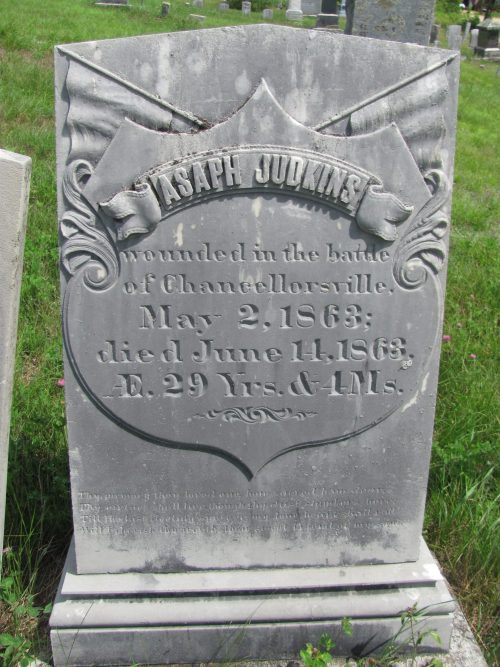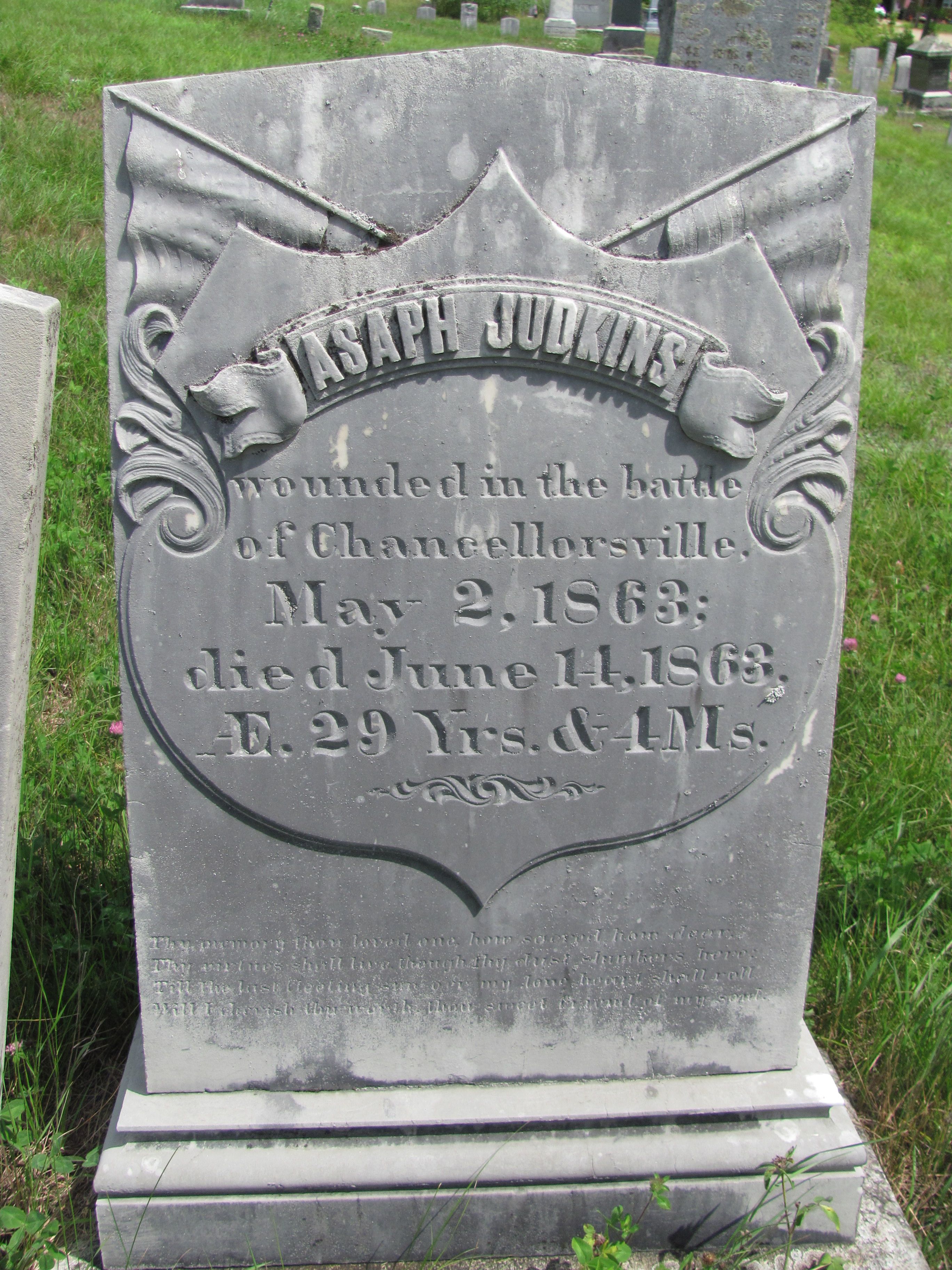
The Judkins Brothers
On 30 May 2021 by TRaymond
Photo credit: Gail Kelly
Growing up I always had a love for learning about the Civil War. It was an insatiable thirst which had no tangible reason to exist. Maybe it was because it was a war that held so much promise to bring our nation even closer together, to create a more just and stable union, a country for all people – and utterly failed. (If you don’t understand that last part, study the Antebellum years. A lot of schools in the US gloss over that and you’ll find out why.) Or it could have been that the war brought to a head the concept that a nation so large is bound to hold varying, and sometimes disastrously so, difference in morals and political views, an issue that still lingers. As a student, and now a parent, I feel that the Civil War is never studied deeply enough, especially when many of our nation’s current issues are rooted so tightly to the outcome and lack of follow-up from that war.
So, being partial to the time period of the Civil War, I tend to keep an eye out for family members that may have fought during the time. With Memorial Day drawing near, I felt it fitting to share one of the family stories that I have uncovered over the years.
Philip and Rachel (White) Judkins are my 5th great-grandparents. Married in Weld, Maine, on Dec 6, 18291, the Judkins had seven children born between 1831 and 1846.
i. Orrin Judkins b. 18312
ii. Willard W Judkins b. 1831
iii. Asaph Judkins b. 1834
iv. Irene Judkins b. 18363
v. Benjamin Judkins b. 1839
vi. Eastman Judkins b. 1840
vii. Mercy Ann Judkins b. 18464
Given the dates of birth, it’s easy to figure that at least one, if not multiple, of the brothers would be in the Civil War was a bit obvious. What was surprising it that all five of the Judkins brothers fought in the Civil War.
Orrin Judkins, the oldest brother, had moved out of Carthage early on. After marrying in Boston, he and his wife (Ellen Dinan)5, moved to Wisconsin6, where they were living when he mustered into Company B of the 23rd Wisconsin Volunteers. He left for the war leaving his four children and wife hoping for his return.7
Back in Maine, Asaph, who was living in Lewiston8 with his newly wedded wife in 18609, volunteered for service. He found himself in the Company H of the 10th Maine Infantry with his brother Willard.10 While Asaph and his wife had not yet had time to start a family, his brother Willard left wife Melissa with three boys to tend to and expecting a fourth.11
In 1860, the youngest two of the Judkins brothers, Benjamin and Eastman, were still living on the farm. they also signed up for the war. Eastman found himself in the same company as Asaph and Willard.12 Benjamin was placed in Company E of the 32nd Maine Infantry.13 Neither of the younger brothers were married.
Five brothers went into the Civil War. Only three came back.
Asaph, Willard, and Eastman all began in Company H of the 10th Maine Infantry as privates, but when the company was restructured after the leaving of some men mustered out, their company was changed to Company B. In the new Company B, Asaph and Eastman remained privates, but Willard was promoted to corporal.14 With all three brothers in the company, the ensemble arrived at Chancellorsville. On May 2, 1963, “strolling about at will, or lying under the trees, enjoying the delightful air and sunshine” (from History of the First-Tenth) when they were attacked by a rebel battery. Asaph, would had been sitting on the bank of the river, was severely wounded in his foot by a shell fragment. “Two men remained with him until he was taken in charge by some surgeon.”15 One can only imagine that these “two men” were Willard and Eastman, knowing how disastrous a foot injury could prove at that time. Unfortunately, Asaph developed gangrene from his injury and died June 14, 1863.16
Eastman and Willard would continue on with the 10th Maine until Company B joined on with the 29th Maine. Willard received another promotion and became a sergeant of Company F during his remaining time17, while Eastman remained a private in Company H.18 The brothers mustered out on January 11, 186519 and May 21, 1865,20 respectfully. They would be the only two of the Judkins boys to make it out of the war.
Orrin, the eldest of the Judkin brothers, passed away roughly a month before brother Asaph. While marching with Company B of the 23rd Wisconsin Infantry, the only unit he served with, Orrin was taken ill with “chronic diarrhea,” which more than likely was dysentery. Like many soldiers killed in the Civil War, his death didn’t come from a bullet. Orrin Judkins mustered out of the military due to death from illness on April 10, 1863,21 at Van Buren Hospital in Millikens Bend, Louisiana.22 His wife was left to fight for his pension, tend a farm, and raise four young boys on her own.23
Benjamin Judkins suffered a similar fate as his brother. As Company E and the rest of the 32nd Maine pushed had on the march to Cold Harbor, “the severity of the march, pursued with such rapidity beneath a burning sun, and along scorched and dusty roads, had exhausted the strength of some. And from this cause, there were losses by so-called “straggling”, as in many cases men who were worn out and wearied beyond the power of endurance, were unable to keep up with the swiftly-moving columns, and compelled to fall out.” It’s easy to imagine that many of these soldiers were not only exhausted, but were also malnourished and/or dealing will illnesses such as dysentery. While the 32nd Maine avoided conflict during this period, many of those men who fell out of line were captured by the Confederates, including Benjamin Judkins.24 It was recorded that Benjamin died in Libby Prison on June 30, 1865, from disease.25
In an unfortunate twist of fate, both daughters of Philip and Rachel Judkins also passed away during the time of the Civil War. Mercy Ann died at the age of 15 on January 3, 1862,26 unwed. Irene (Judkins) Whitney passed away on September 18, 1860,27 leaving behind a husband and two sons.
This blog entry was written as an expression of love and remembrance for those who have died in war.
To Orrin, Asaph, and Benjamin, I say a well belated thank you for your greatest sacrifice. May you rest in power and peace.
1 Maine Marriages, 1771-1907, database, familysearch.org.
2 New England Historic Genealogical Society; Boston, Massachusetts; Massachusetts Vital Records, 1911–1915, p. 156
3 Philip Judkins household, 1850 US Census, Carthage, Franklin Co., Maine, pg 37.
4 Philip Judkins household, 1860 US Census, Carthage, Franklin Co., Maine, pg 13.
5 New England Historic Genealogical Society; Boston, Massachusetts; Massachusetts Vital Records, 1911–1915, pg 1562.
6 Orrin Judkins household, 1860 US Census, Kendall, Lafayette Co., Wisconsin, pg 12a.
7 The National Archives, case files of approved pension applications of widows and other veterans of the army and navy who served mainly in the Civil War and the War with Spain, compiled 1861-1934, roll WC32884-JUDKINS-Orrin, image, familysearch.org.
8 Asaph Judkins household, 1860 US Census, Lewiston, Androscoggin Co., Maine, pg 99.
9 Maine Marriages, 1771-1907, database, familysearch.org.
10 Gould, M. J. M., & Jordan, R. L. G. (1871). The History of the First-Tenth-Twenty-Ninth Maine Regiment in Service of the United States from May 3, 1861, to June 21, 1866. Portland: Stephen Berry. pg 328.
11 Willard Judkins household, 1870 US Census, Carthage, Frankly Co., Maine, pg 8.
12 Gould & Jordan (1871), pg 328.
13 (Benjamin’s Unit list)
14 Gould & Jordan (1871), pg 379
15 Ibid., pg 343-344.
16 Ibid., footnote, pg 344.
17 Ibid., pg 627. Mistakenly recorded as “William Judkins.”
18 Ibid., pg 631.
19 US Civil War Soldier Records and Profiles, 1861-1865, database, Ancestry.com.
20 Ibid.
21 US Civil War Soldier Records and Profiles, 1861-1865, database, Ancestry.com.
22 US Registers of Deaths of Volunteers, 1861-1865, pg 51.
23 The National Archives, case files of approved pension applications of widows and other veterans of the army and navy who served mainly in the Civil War and the War with Spain, compiled 1861-1934, roll WC32884-JUDKINS-Orrin, image, familysearch.org.
24 Houston, Henry C., (of Co. C). (1903). The Thirty-Second Maine Regiment of Infantry Volunteers – A Historical Sketch. Portland, ME: Press of Southworth Brothers. pg 258-259.
25 US Civil War Soldier Records and Profiles, 1861-1865, database, Ancestry.com.
26 Gravestone photo, Newman Cemetery, Carthage, Maine, findagrave.com #183851098.
27 Gravestone photo, Newman Cemetery, Carthage, Maine, findagrave.com #183791232.
As with all written pieces of genealogical research, the findings in this piece are subject to change based on new evidence as it becomes known.

Active member of:


